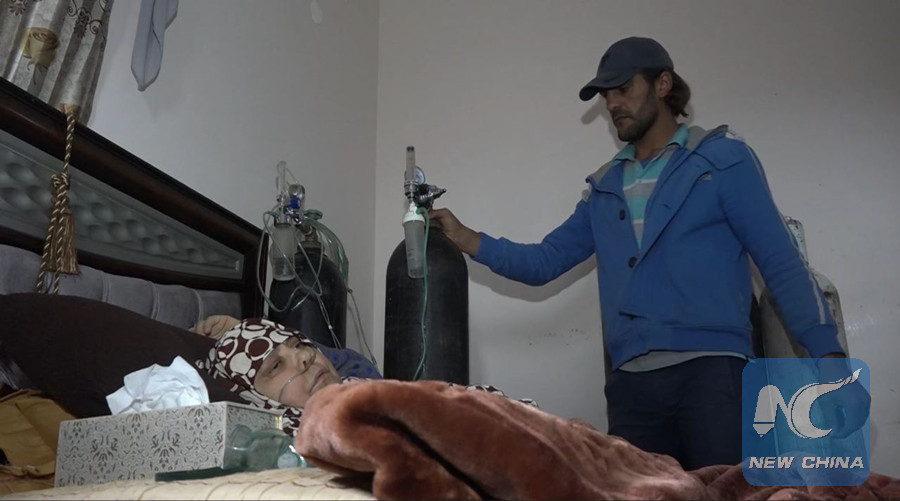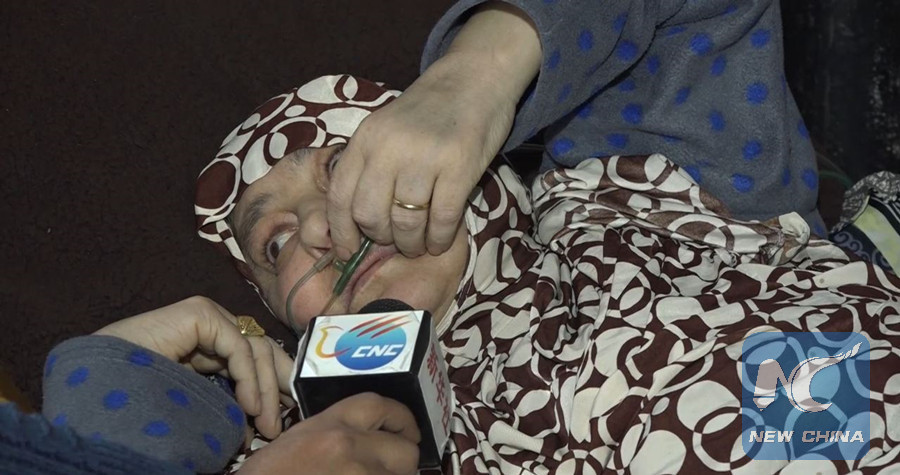
Rabeeha al-Assar, 54, suffers from pulmonary fibrosis, which forces her to take oxygen therapy around the clock. (Xinhua photo)
GAZA, Feb. 13 (Xinhua) -- After Israel's 11-year-long blockade on the Palestinian Gaza Strip, limited health care and lack of necessary medicines have made life worse and worse for people with chronic diseases in the coastal enclave.
For Rabeeha al-Assar, 54, the situation is even more complicated as she suffers from pulmonary fibrosis, which forces her to take oxygen therapy around the clock.
Pulmonary fibrosis is a progressive, scarring lung disease that is incurable, because the lungs slowly become stiffer and develop a honeycomb appearance that can be seen on a CT scan.
Oxygen therapy is commonly prescribed for patients with pulmonary fibrosis to treat low levels of oxygen in the blood, which is caused by scarring in the lungs.

Rabeeha al-Assar, 54, suffers from pulmonary fibrosis, which forces her to take oxygen therapy around the clock. (Xinhua photo)
In her room, several large oxygen cylinders lined up around the bed where she has been ridden for five years already.
For her, a continuous flow of pure oxygen is badly needed to increase the concentration of oxygen in the lungs and elevate oxygen levels in the bloodstream.
The woman started to suffer from the disease 15 years ago, but her condition dramatically deteriorated in the past five years.
Removing the cannula, which is a tube consisting of two prongs placed in the nostrils to deliver oxygen, may put her life in danger.
Al-Assar, a mother of 15, is now unable to move as she has to receive oxygen treatment 24 hours a day.
"The cannula must be placed in my nose all the day," she said in an intermittent tone. "Oxygen cylinders and concentrators are everywhere in my house."
Al-Assar needs 12 oxygen cylinders a day to survive. Bringing these tanks home is a daunting task for her sons who take turns to secure the oxygen containers for their ailing mother.
The job is not easy at all for them.
"Our business is idle now because all of us have to be around our mother," Mousa, one of al-Assar's sons, told Xinhua as he checked oxygen cylinders in his mother's bedroom.
He said his brothers and him have to be with her 24 hours a day to change the cylinders and take care of oxygen devices and pipes.
Altough oxygen treatment helps the woman survive so far, but it is never the final solution.
Al-Assar now is in desperate need of a lung transplant after all types of drugs have failed to alleviate her disease.
Her family appealed to the government to help al-Assar travel abroad for treatment since local hospitals in Palestine lack advanced treatment for this disease.
Al-Assar is only one of the thousands of patients suffering from the tight blockade Israel has been imposing on Gaza since Islamic Hamas movement's violent takeover in 2007.
According to the World Health Organization, the Israeli authorities have delayed or denied 40 percent of the patients in Gaza their access to medical care outside the besieged coastal enclave since last July.
Last week, the Gaza Ministry of Health announced the suspension of medical operations in 16 healthcare centers across the enclave, citing the severe shortage of power and fuel.

